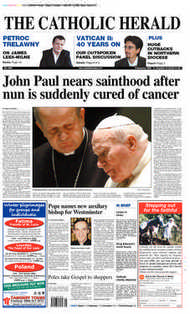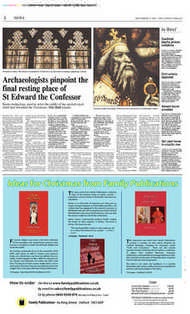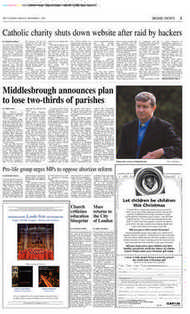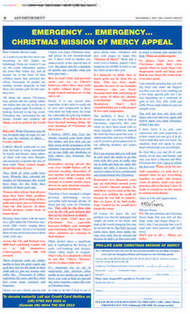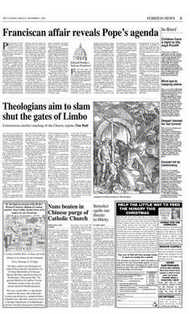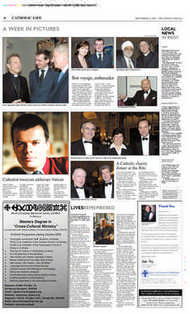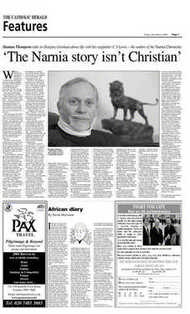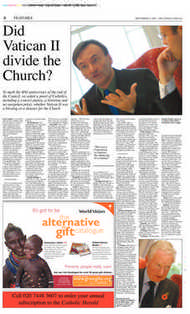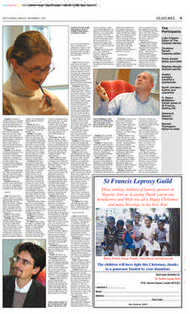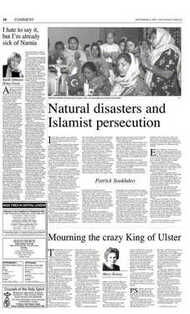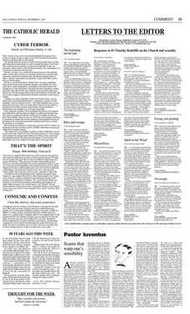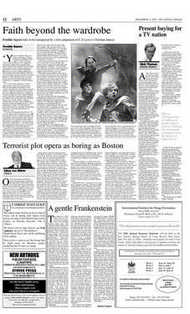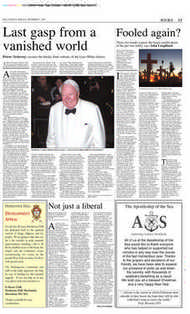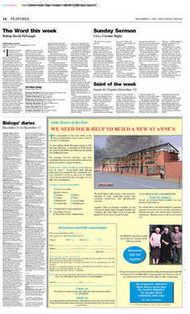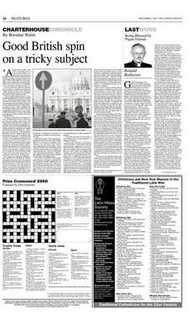Page 8, 9th December 2005
Page 8
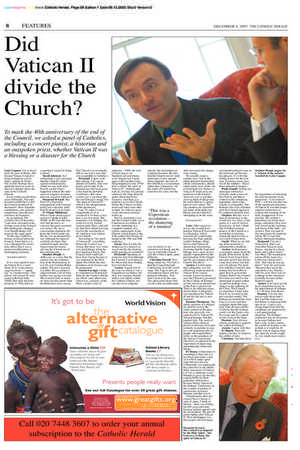
Page 9
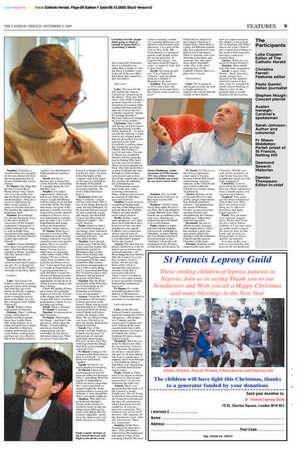
Report an error
Noticed an error on this page?If you've noticed an error in this article please click here to report it.
Tags
Share
Related articles
That’s The Spirit
Ten Things To Watch Out For In The Year To Come
Top Cardinal Predicts End To Celibacy Rule
Catholic Dilemmas This Year Marks The 50th Anniversary Of...
How Vatican Ii Became The Biggest Meeting In The History...
Vatican II divide the Church?
To mark the 40th anniversary of the end of the Council, we asked a panel of Catholics, including a concert pianist, a historian and an outspoken priest, whether Vatican II was a blessing or a disaster for the Church
Luke Coppen: Let us travel back 40 years to Rome. The Second Vatican Council is being brought to a close with a solemn Te Deum. The world’s bishops have spent the last four years in intensive debates about the state of the Catholic Church.
Every author recalls those years differently. The only incontrovertible fact is that the Council produced 16 documents: three dogmatic constitutions, one pastoral constitution, nine decrees and three declarations.
In an editorial, The Catholic Herald describes “a peculiar sensation in the closing week of the Council that nothing has changed even though things will never be the same again”.
To this day, Catholics remain confused about the Council. Some believe it was a blueprint for revolution, others that it was a pastoral reaffirmation of unchanging teachings.
AGGIORNAMENTO If we were asked to sum up Vatican II in a word, many of us would choose aggiornamento – “updating” or “modernising”. The phrase will always be associated with Pope John XXIII. But what did John mean by it? Why hold an ecumenical council to bring it about?
Sarah Johnson: As I understand it, you can argue that the Church’s stand against totalitarianism, which we saw with John Paul II, couldn’t have happened without the statement on religious freedom that was issued at Vatican II.
Desmond Seward: But Paul VI’s Ostpolitik [engagement with Communism] was a disaster. John Paul II stood it on its head.
Fr Shaun Middleton: When I think about aggiornamento I think of John XXIII, an 80-year-old man who had the nerve to convene this great ecumenical council. He was a consummate diplomat. He knew the Curia inside out. But he was an unusual Italian. Although he enjoyed comforts, he knew that comfort brought sterility. Aggiornamento means moving the Church out of the comfort zone.
Stephen Hough: It strikes me, in a way, that the council was the continuation of the Reformation. It was the real Counter-Reformation. Not just a reaction to Luther, but an acknowledgement that a lot of what Luther was saying was true. The Council took so much of what was true about what the Reformers were saying. The Church was eventually able to say it in a way that was acceptable to Catholics.
Desmond: I agree with that entirely. I’m a great admirer of Luther, who very nearly got it right. If the Dominicans had been given a free hand he probably would have. But what worries me is not about the Second Vatican Council, but “the spirit of Vatican II”, which is the interpretation of the documents.
I am 70; when I was at Ampleforth all of us wondered if we had a vocation, a lot of us tried. The monastery was bulging. An awful lot of my friends went to daily Mass, and still do. But their children do not receive the sacraments at all. And they very seldom go to Church.
According to “the spirit of Vatican II”, everything before the Council was wrong. But there were some very good things about the pre-conciliar Church. The Council itself could not have been wrong because it was inspired by the Holy Spirit, but I think the interpretations of its decrees can be questioned.
Austen Ivereigh: I think it’s important to distinguish between the Council and the era which came afterwards, which was, certainly, in the West, a major crisis of authority – 1968, the riots of Paris and so on.
Suddenly all institutions were disrepected. I quite agree with you that something happened in the 1970s that is called “the spirit of Vatican II”, which people took as a licence for general rebellion; the Pope himself spoke about that in his memoirs. And there is a tendency to see the Church before the Council in dark terms and what came after in light. As with any great event, historical amnesia settles in.
But it’s important to see that the Council really was a Copernican revolution. It was the shattering of a complete mindset, of a culture, particularly in the Church, which began in the 11th century but reaches its height in the 19th and 20th centuries...
Sarah: Was it really the shattering of a mindset or was it merely the marking of the passing of a mindset?
Desmond: Speaking as someone who lived through the Council, I welcomed it. It’s the results that, frankly, have horrified me.
Austen: A quick list of the ways in which it was a Copernican revolution: the idea, for example, that the truth is not wholly within the Catholic Church, but can also be in religions outside; the declaration on religious freedom: the idea that the Church doesn’t seek preference in law against other religions; the idea of the Church as a communion rather than a hierarchy. All the truths of Catholicism remained the same, but the way in which we see ourselves as Church and the way in which the Church sees the world is quite, quite different.
Christina Farrell: Two things strike me. The first is that the Council brought Catholicism on to the world stage. The Pope is now an international figure and has political influence. That didn’t used to be the case. The other point about Vatican II is that an understand able movement for change went wrong.
We actually made a mistake here. Just as the urban planners demolished whole communities, demolished whole areas of the city to build high-rise blocks so Vatican II swept away the traditions of the Church. And now you’ve got that clawing back of things and the sense that we’re going back to core values. The city planners are demolishing many of the high-rise blocks and the Church is attempting to do the same.
COLLEGIALITY Luke: After aggiornamento, the second most popular Vatican II buzzword is collegiality, which concerns the relationship between the Pope and the world’s bishops. Many believe that Vatican II altered that relationship, declaring that the Pope and bishops were, more or less, equally responsible for the proclamation of the Gospel and the governance of the Church. But did it?
Austen: I would argue that collegiality was not effectively implemented in Vatican II for various reasons. Lumen Gentium says the Church is governed by the College of Bishops – yet the universal jurisdiction of the Pope is preserved. There is an inherent contradiction there. Collegiality was introduced by Vatican II, but the old idea is also retained.
Damian Thompson: The whole question of collegiality must be seen in the wider context of the question: who precisely was empowered by Vatican II? Not just bishops, but likeminded laity. The spirit of Vatican II has allowed power at diocesan level and certainly in parishes to pass to a self-appointed elite of people who regard themselves as the guardians of the Vatican Council and who have co-operated in the imposition of depressing and politically motivated liturgy.
Fr Shaun: I think there is something in that, but it is too black and white a take on it which makes great copy but not a lot else. Collegiality was supposedly the corrective to the infallability statements of Vatican I. It was a challenge to the bishops to grow up and take responsibility for their particular conferences, because before Vatican II the Bishops’ Conference in this country consisted of sandwiches on Easter Monday and that was it.
Unfortunately after any council there’s always a state of chaos. I think of Nicaea – there was rioting for 100 years after that because nobody agreed with the declarations. We got off pretty lightly after Vatican II. What did happen was that people who felt angry and disenfranchised came to the forefront and became key players. It’s a bit like falling in love for the first time. Common sense goes out of the window – hence those diabolical liturgies.
Paolo Gambi: In Italy the episcopal conference certainly made a mess of the Church, and that is evident in the continuing arguments about what exactly is collegiality. The bishops who were ordained after the Council appear to be confused about its aims.
Stephen: But this was a time of democracy in the world and, in a sense, collegiality is a sort of clerical democracy. In fact, I think that if bishops remain princes of the Church in a world that is rejecting monarchy then we have a real clash of ideas here.
Sarah: What we are talking about primarily is administrative deadlock.
Austen: In democracy, sovereignty comes from the people, from below. In the Church from Jesus Christ onwards, power has always come from above and that can’t be altered. The problem with the Council is that nobody has been able to agree how to govern the Church. Before the Council the Curia saw itself as the instrument of papal authority and the bishops were subject to the authority of the Curia. The Council reversed that. Under John Paul II we reverted to the pre-conciliar model. The bishops are treated like altar boys as it were and they complain about that regularly. One obvious reform would be that the bishops could visit the Curia every five years and do a report on the Curia to the Pope.
Damian: One obvious reform would be to improve the calibre of bishops.
Austen: I agree with that.
Fr Shaun: Then ultimately you have to improve the calibre of laity.
Christina: You talk about the importance of educating the laity but people of my generation – I was born in 1965 – will tell you that one of the significant outcomes of Vatican II was that proper religious instruction in schools, the teaching of the faith, disappeared. It was just dire. My mother’s generation can recite their penny catechism, they were well versed in the teachings and tenets of the faith – we weren’t. That was part of this movement for modernisation. We’ve lost that history, that understanding.
Desmond: I’m not a Tridentinist. But I can remember being in rural France, staying in a cheap hotel, and I asked where was Mass. The receptionist reeled off the name of a Lefebvrist church and I said: “But why do you go there?” And she answered: “Because they teach the catechism every Sunday.” And for years there was no teaching on the catechism available because of this blasted Council.
Austen: Can I just say the local church has no say in the appointment of bishops – it’s all done from Rome.
Damian: I’m not sure you’re right about that. I don’t get the impression that Rome is imposing bishops on us – I get a very strong impression that the candidates are proposed by a self-perpetuating oligarchy. The bishops’ conference has its favourites to become bishops and that’s why, in this country, the calibre of bishops is not as high as it might be. If Rome were to impose bishops, then the results might be very much more impressive. Stephen: Certainly in America there are examples of obvious choices for bishops being pushed aside in favour of politically correct choices.
Fr Shaun: One thing that the late Cardinal Basil Hume always said, which was very cute really, was that the English bishops are not theologians – they are a pastoral conference. In other words, nobody is going to rock the boat and that enabled the oligarchy to perpetuate itself.
Damian: Even though I’m driven absolutely crazy by the naïve political correctness of the bishops’ conference’s statements, I would welcome Left-wing as well as Right-wing mavericks being appointed as bishops because I think it would rejuvenate the Church.
Austen: I know that there have been very good candidates who have been unacceptable to Rome, and that’s why they haven’t been appointed.
Stephen: But this all seems to come back to playing safe. It’s as though we are afraid to let the Church surrender to the Holy Spirit.
LITURGY Luke: The Council of Fathers called for a careful, general reform of the liturgy and what they got were guitars in church, a ripping out of altars and kindergarten vernacular translations of the Mass. So why did a liturgical crisis follow Vatican II?
Sarah: What’s wrong with guitars in Church?
Damian: There’s nothing wrong with guitars in Church so long as people know how to play them. One of the features of so many fast-growing evangelical churches is that they employ professional musicians to play modern music and they are very effective. But in the Catholic Church, “guitars” are shorthand for badly performed amateur music.
Sarah: But that is because this is music that comes from the community. It is people doing the best that they can.
Stephen: I’m rather impressed by what Liszt had to say about this. He always sought out Masses with no music at all and that was in the 1870s. We think that music was great in the past and is terrible now, but in an earlier era the operatic tradition of Masses was a real distraction to worshippers. In some ways, I can’t help thinking that going back to no instruments would be a better option.
Fr Shaun: What Sacrosanctum Concilium [The Constitution on the Scared Liturgy] called for was full conscious and active participation. Have we actually achieved those critical things? Listen, you lot didn’t have to sit around coffee tables in the 1970s singing “If I was a fuzzy, wuzzy bear, I’d thank you Lord for my fuzzy, wuzzy hair.” I also spent four years as a monk at Ampleforth, so I can sing plainchant as well. But there’s room for all sorts of liturgical expression in the Church. It is not appropriate to sing Spem in Alium if you’re doing a children’s liturgy.
I think the quality of liturgical music has gradually improved. Overall, if I look at the liturgy and ask have we got full, active conscious participation, I think we’ve got three out of four.
Sarah: What’s missing? Fr Shaun: Conscious. Damian: An unconscious laity? Explain.
Fr Shaun: When I plan the liturgy – and there’s the giveaway: when I plan the liturgy – I want readings and music which the congregation can take ownership of, but that in turn takes education. What we haven’t had, after the Council, is liturgical formation for the laity – it’s been left in the hands of the “experts” and in the majority of cases it’s still left in the hands of the parish priest who may not have the necessary expertise. We need a fuller formation process.
Desmond: Today the Mass is didactic – where did that come from? This is one of the things that nearly made me turn Orthodox. At the Second Vatican Council we had a perfectly acceptable decree, but then Paul VI gave the Mass back to “liturgical experts”. The result: disaster.
Paolo: I think we had a very beautiful heritage in our liturgy. After Vatican II they could have made a new tradition of beauty – but they didn’t do that.
Stephen: Let’s not get carried away with the idea of pre-conciliar beauty. My Benedictine parish in Warrington had a Latin Mass every Sunday and they used Gregorian chant accompanied by the organ in horrible 19th-century saccharine arrangements. It was a 19th-century thing, and it’s interesting that Pope Pius X tried to remove that influence and get back to the purity of the Mass.
Damian: Has the ICEL translation of the Mass that we’ve been using up till now been a help or a hindrance in nurturing a sense of community?
Austen: I think the 1973 translation is full of imperfections and needs to be revised. There was an excellent translation in 1998 that was turned down by Rome which I think really does capture the beauty of the Mass. We’ve still got a long way to go. The key is to have lay people dedicated to liturgical ministry.
Sarah: One of the reasons I left the Anglican Church was because I’d had enough of constant witterings about liturgy. But now, in fact, I see that wittering about the liturgy does help to keep people conscious of it.
Fr Shaun: Liturgy is the most powerful thing that we have as a Church – it’s what binds our community together.
Sarah: Yes but it’s so easily emptied of meaning.
Fr Shaun: I think the present proposed translations are rather too precious. There’s something about the quality of ordinariness which we tend to disparage. We’ve got to get back to elegant simplicity. At the moment what is coming out of Rome is very elegant but there’s not much simplicity.
Stephen: Why don’t we go back and attempt a reform of the reform? It would be easier to take the liturgy from 1962 and do some of the things that the Council suggested – prune away the unnecessary repetition and give us a liturgy that is basically Tridentine but in a reformed way rather than a totally re-written Mass. I wouldn’t want to get rid of the new Mass but I think that would be a nice alternative.
THE LAITY Luke: The laws for the laity before the Vatican Council are summed up in the phrase: “Pray, pay and obey.” One of the Council’s greatest concerns was the formation of a mature laity. Cardinal Heenan said that after the Council life for Catholics would be “harder but perhaps healthier”. How has Vatican II changed the lives of lay people?
Christina: This is difficult for me, as I don’t know what the Church was like before Vatican II – we grew up with the reforms. I come back to my original point that my generation was not educated in the faith. Everybody is talking about this wonderful universal Church, but frankly it’s very hit and miss. I’m sure Fr Shaun has wonderful liturgies and lay participation in Notting Hill, but it isn’t the case everywhere. There are many people out there who turn up for Mass as good Catholics but who, through no fault of their own, haven’t got a clear idea of the significance and the sacrifice of what they are participating in.
Watch people coming back to the pews after receiving communion. Many of them seem to have no concept of what they have just received.
Stephen: I come from an evangelical background, and one of the things that I noticed about the Catholic Church was that people rarely talked about it.
Paolo: In Italy, many more people are very open about their faith these days. It used to be the case that just priests were openly Catholic; now politicians, writers and all sorts of people profess their faith in a way that didn’t happen before the Council.
Austen: The idea that lay people should have a life of prayer, go on retreats, take spiritual direction – all these things became normal after the Council in a way they certainly weren’t before. We are moving from a laity which is unconscious and passive towards a laity that is conscious and active. There’s been a revolution and it is now quite normal to have lay people reading, distributing communion and so on.
Fr Shaun: It’s worth remembering that in this diocese of Westminster alone, 7,000 people work as catechists in our parishes.
LEFT AND RIGHT Luke: In the Second Vatican Council, reporters noted the emergence of two sub-species – the progressive Catholic and the conservative Catholic and since Vatican II the same classifications have influenced almost every aspect of Church life. Is this factional division a legacy of the Council?
Desmond: What do you mean by liberal and what do you mean by conservative? Because the point is we all have conservative bits and we all have liberal bits. I am a conservative, I suppose, but I went through a very Lutheran phase. I find Marx very stimulating. It’s a terribly hard distinction to make.
Paolo: I think as Christians if we choose to divide ourselves as liberals and conservatives we are not following the right way.
Austen: There is no question that the legacy of the Council is being fought over. We are living in turbulent times because the Council reintroduced the idea of communion, which had been lost for centuries. It was too much to assimilate. The Council was not in itself divisive. The majority of the documents were virtually unanimous. There was consensus.
Stephen: In the New Testament we have disciples – Paul and James – representing the traditional and radical wings of the emerging Church. We must come to maturity, so that we can hold differences of opinion with kindness and openness. I live part of the year in New York. My local church is a trilingual parish, with people across the social spectrum. It requires the clergy – fun and open-minded Franciscans – to make it work, but it does work.
Sarah: You hear people say “I’m a Vatican II Catholic” and you think, hang on a minute, I thought we all were.
Stephen: The question is, if we don’t have the paradigm of an open flexible Church what would we have?
Damian: Do you think Pope Benedict will give us this open and flexible Church?
Stephen: I think it more likely than under the previous Pope. He is big enough to contain different views. John Paul II was so confident in his own views. Benedict, by contrast, has proved himself to be a better listener.
Paolo: I think it is important not to divide Catholics between Left and Right. As Christians, we know that the one who divides is the devil. In ancient Greek, in fact, “diabolon” is from the verb meaning to divide. We have to find unity, not division. So I think that we should see the Catholic Church as a unique body, where there is a place for different sensibilities. It is a question of sensibilities, not of ideologies. There is someone who cares about the Latin Mass, and someone else who cares more about charitable work. This is the most amazing face of the Catholic Church: there is a place for everyone.
SUGGESTIONS Luke: We’re going to ask people to come up with a simple solution to improve the vitality and the morale of the Church.
Fr Shaun: I’d like to see the Vatican diplomatic corps open to women, because I think that would acknowledge women’s ministry in the Church and also would enable the Church to avoid the charge of patriarchy.
Austen: Reform of the Curia and effective collegiality, proper implementation through structural reforms – and particularly the synod of bishops. Greater recognition to the regional Church and strengthening the bishops’ conferences rather than undermining them.
Desmond: An end to efforts to make dialogue with Anglicanism, which has reached a dead end, and greater efforts for dialogue with the Orthodox Church and the ancient Churches of the East.
Damian: Nothing would empower the laity more than an improvement in the calibre of local bishops in England and Wales and in the wider Church and a rapid dismantling of the useless bureaucracies that have coalesced around them.
Austen: What do you mean by better bishops?
Damian: More intelligent and more imaginative.
Sarah: I agree with Shaun – there must be a steady, progressive increase in the appointment of women to key jobs. And it’s completely upside-down thinking to object to this on the grounds that it would frighten off the Eastern Churches. Would you wall up the windows of your house because the neighbours might not like your wallpaper?
Christina: A move away from the mindset that says Mass attendance once a month makes you a practising Catholic.
Stephen: Two years ago the Pope returned an icon to the east, Why don’t we return everything we’ve taken or borrowed and make bigger gestures?
Paolo: You all made very concrete suggestions. Please don’t take me for a naive Italian Catholic if I say that what we really need is prayer. We have to pray to Our Lord, and we have to bring people to prayer and the sacraments.
It is only in this way that we can find the solutions to all our problems.
blog comments powered by Disqus


